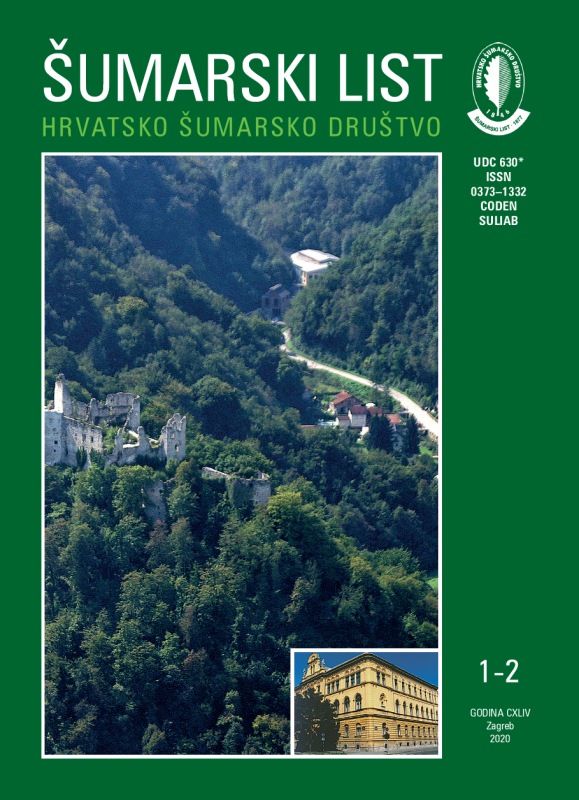
broj: 1-2/2020
pdf (10,44 MB) |
|
||||||||||||||
| RIJEČ UREDNIŠTVA | ||
| Uredništvo | ||
| Should forest pay for everything? pdf HR EN | 5 | |
| EDITORIAL In the last double issue we raised the question whether the National Forestry Policy and Strategy should be modernised. While still waiting for some answers, we have only heard that the topic deserves a wide specialist discussion. This means that such issues will continue to be treated individually when they occur, instead of being solved on a global level. We hinted that there certainly were some more questions, and we did not wait long for the reaction; in the Business Diary (Poslovni dnevnik) we have read that the wood processors require from the trading company “Hrvatske šume” a 15% decrease in timber prices and prolonged payment terms of the former 90 days, or, according to the latest information 120 days. The demand accounts for 20% price decrease in wood products on the market and 25% decrease in orders, which calls for compensation measures from the Government. It is said that the most affected are the manufacturers of pellets and pellet-formed fuelwood - the products with low added value. We wrote about these products (as well as about parquet and final products) on several occasions, pointing at the fact that pellets are primarily the waste material from final wood processing, the dry wood, while the moist wood requires price-raising drying to achieve a required degree of moisture. So far they have been compensated by the brutally “cheap raw material”; now both price reduction and payment terms are required. If it is 90 days it means a turnover of 4 (for 120 days it rounds up to 3 - which is a catastrophe). There would be no insurance of the existing situation, not to mention the development. Indeed, does it matter anything at all when forests are here to pay the bill?! The advocates of non-market business from the wood sector suggest that the Government after serious interventions in ship building and through the consolidation of strategic firms has the opportunity to accept urgent sector measures through the business of the Croatian Forests Ltd. With the mentioned price decrease of 15% and the payment prolongation of 120 days, of the seven measures proposed to the Government a significant component of the market business operation is the interesting one - the elimination of the retail sale in Croatian Forests Ltd., which means the elimination of the competition. Compared to the selling prices of the main wood assortments on the markets in the region (Austria, Italy, Hungary, Bosnia & Herzegovina and Serbia), the prices at which Croatian Forests Ltd. is selling their wood assortments to our wood manufacturers amount to round 500 million hrk a year, by which money have the wood manufacturers already been encouraged. Another question is how the wood manufacturer helps Croatian Forests Ltd. with solving the issues of raw wood stock. When they need raw material they exert pressure upon suppliers without considering weather conditions and the damage upon the forest soil; When there is stock surplus, it is not their problem in spite of the signed contracts! To the unpaid credits and debits to Croatian Forests we shall refer on another occasion. We shall not even mention the pre-bankruptcy settlements as well as the explanations of the responsible parties saying that these measures are saving the jobs in wood processing instead of doing favour to the big debtors. A firm with significant rent status as to raw material asked for Government intervention. They received encouragement but the whole “management team” that brought the firm to this situation stayed in charge! What can be said after all this but wonder what kind of policy which supports non-market business in forestry protects the forest as national wealth while encouraging the development of both primary and final wood processing? The answer is in the results!<br> Editorial Board | ||
| IZVORNI ZNANSTVENI ČLANCI | ||
| Tomislav Poršinsky, Vlado Petreković, Andreja Đuka | UDK 630* 523 (001) https://doi.org/10.31298/sl.144.1-2.1 | |
| Bark thickness of wild cherry in timber scaling pdf HR EN | 7 | |
| Stjepan Kvesić, Dalibor Ballian, Mirzeta Memišević Hodžić | UDK 630* 164 (001) https://doi.org/10.31298/sl.144.1-2.2 | |
| Leaf variability of field maple populations (Acer campestre L.) in Bosnia and Herzegovina pdf HR EN | 15 | |
| Osman Mujezinović, Kenan Zahirović, Milivoj Franjević, Mirza Dautbašić | UDK 630* 443 (001) https://doi.org/10.31298/sl.144.1-2.3 | |
| Trophic preferences and influence of beech weevil on the damaged leaf area of beech trees in Bosnia and Herzegovina pdf HR EN | 27 | |
| Sercan Gulci | UDK 630*360 (001) https://doi.org/10.31298/sl.144.1-2.4 | |
| Productivity of a farm tractor with single drum winch during whole-tree timber extraction pdf HR EN | 35 | |
| Vania Kachova, Angel Ferezliev | UDK 630*261 (001) https://doi.org/10.31298/sl.144.1-2.5 | |
| Improved characteristics of Populus sp. ecosystems by agroforestry practices pdf HR EN | 45 | |
| PRETHODNO PRIOPĆENJE | ||
| Natalie Levandovska, Jaromir Kolejka, Božena Šera, Hubert Zarnovičan | UDK 630* 270 + 907 https://doi.org/10.31298/sl.144.1-2.6 | |
| The recreational potential of urban forests – an application of the assessment method pdf HR EN | 53 | |
| STRUČNI ČLANCI | ||
| Zvonimir Ištvan | UDK 630* 902 https://doi.org/10.31298/sl.144.1-2.7 | |
| 145 year of forestry in Podravina pdf HR EN | 65 | |
| Drago Biondić | UDK 630* 762 + 799 https://doi.org/10.31298/sl.144.1-2.8 | |
| Integral performance index of small and medium wood industrial financial products pdf HR EN | 75 | |


